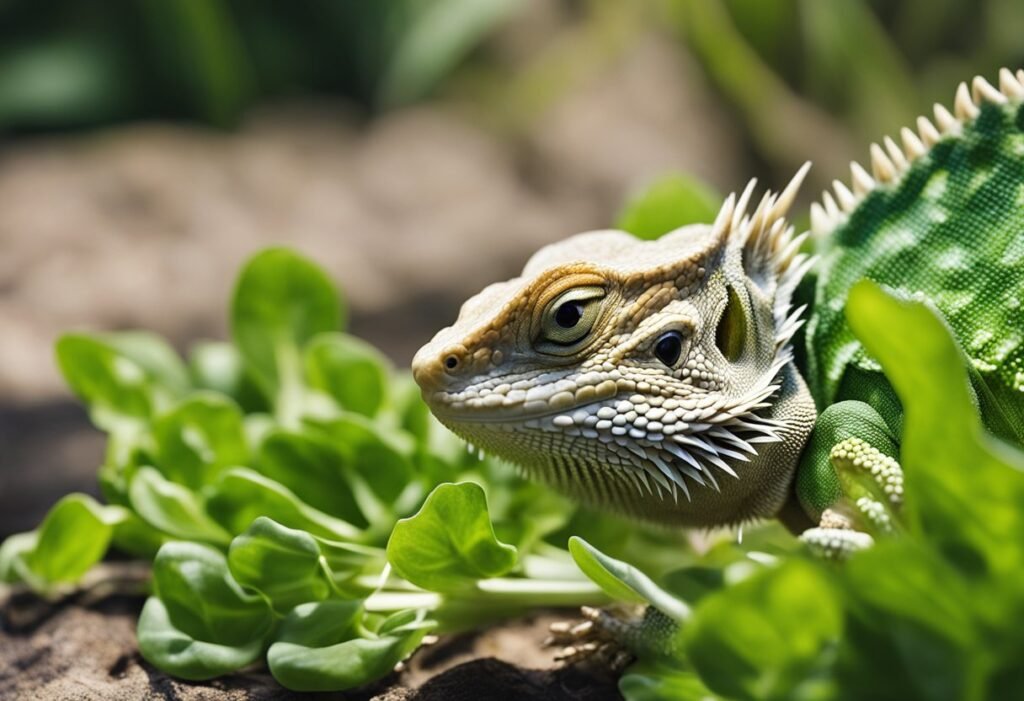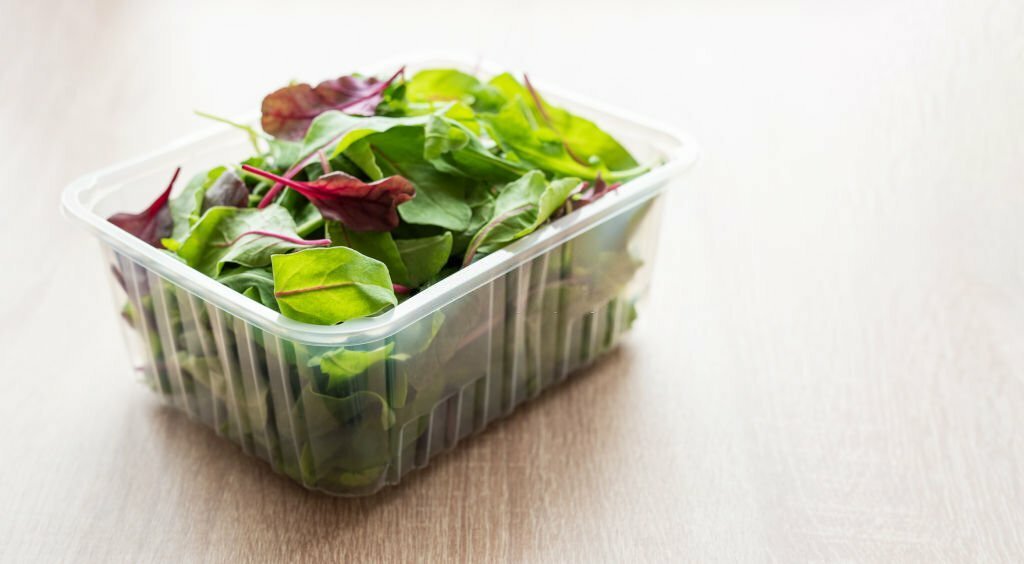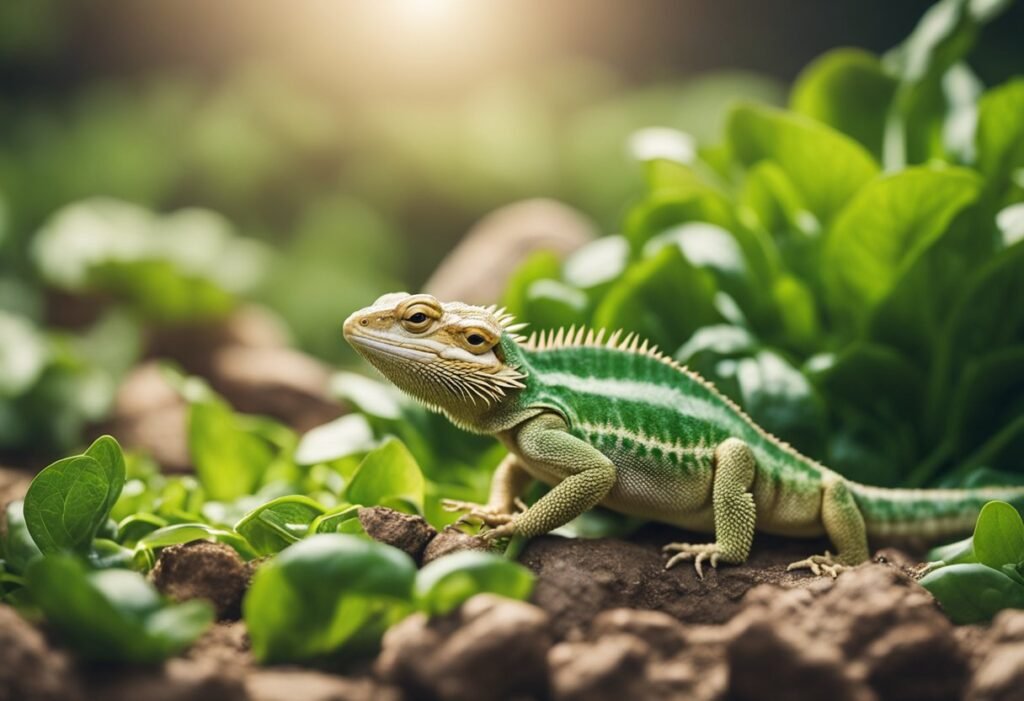Bearded dragons are a popular pet reptile that require a balanced diet to maintain their health. Owners often wonder what foods are safe to feed their bearded dragons, and whether or not certain vegetables are suitable for their diet. One common question is whether or not bearded dragons can eat spinach and spring mix.
Spinach and spring mix are both leafy greens that are often included in human salads and meals. While they offer a range of nutrients, it is important to consider whether or not they are safe for bearded dragons to consume. In this article, we will explore the nutritional value of spinach and spring mix, and whether or not they should be included in a bearded dragon’s diet.
Understanding Bearded Dragons’ Diet

Bearded dragons are omnivores, which means they eat both plant and animal matter. However, not all vegetables and fruits are suitable for their diet. As responsible pet owners, it is important to understand what foods are safe for our bearded dragons to eat.
When it comes to leafy greens, spinach and spring mix are often debated among bearded dragon owners. While these greens are high in nutrients, they also contain a substance called oxalic acid. Oxalic acid can bind to calcium and prevent its absorption, which can lead to metabolic bone disease.
Therefore, we recommend limiting the amount of spinach and spring mix in your bearded dragon’s diet. Instead, opt for leafy greens that are lower in oxalic acid, such as collard greens, mustard greens, and turnip greens. These greens are also high in calcium, which is essential for your bearded dragon’s bone health.
In addition to leafy greens, bearded dragons also require a variety of insects and other protein sources in their diet. Some good options include crickets, mealworms, and dubia roaches.
Remember, a balanced diet is crucial for your bearded dragon’s overall health and well-being. Consult with your veterinarian or a reptile specialist if you have any questions or concerns about your bearded dragon’s diet.
Can Bearded Dragons Eat Spinach?

When it comes to feeding bearded dragons, it’s important to provide them with a balanced diet that meets their nutritional needs. Spinach is a popular leafy green vegetable that many people enjoy, but can bearded dragons eat spinach?
Nutritional Value of Spinach
Spinach is a nutrient-dense vegetable that contains a variety of vitamins and minerals that can be beneficial for bearded dragons. Spinach is a good source of vitamin A, which is important for maintaining healthy eyes, skin, and immune function. It also contains vitamin K, which is essential for blood clotting, and vitamin C, which can help boost the immune system.
Spinach also contains some minerals that bearded dragons need, such as calcium, iron, and magnesium. Calcium is important for strong bones and teeth, while iron is necessary for healthy blood cells. Magnesium plays a role in muscle and nerve function.
Potential Risks of Spinach
While spinach can be a nutritious addition to a bearded dragon’s diet, there are also some potential risks to be aware of. Spinach contains high levels of oxalates, which can bind to calcium and prevent it from being absorbed. This can lead to calcium deficiencies, which can cause a variety of health problems, including metabolic bone disease.
In addition, spinach contains goitrogens, which can interfere with thyroid function and lead to goiter. Goitrogens can also reduce the absorption of iodine, which is essential for thyroid health.
Because of these potential risks, it’s important to feed spinach to bearded dragons in moderation. Spinach should not be a staple food in their diet, but rather an occasional treat. It’s also important to balance spinach with other calcium-rich foods, such as kale and collard greens, to ensure that bearded dragons are getting the nutrients they need.
Overall, while spinach can be a nutritious addition to a bearded dragon’s diet, it’s important to be aware of the potential risks and feed it in moderation.
Can Bearded Dragons Eat Spring Mix?
Spring mix is a combination of various leafy greens, including spinach, arugula, and kale. While some of these greens are safe for bearded dragons to eat, others may pose a risk to their health.
Nutritional Value of Spring Mix
Spring mix contains a variety of vitamins and minerals that can be beneficial for bearded dragons. Spinach, for example, is high in calcium, iron, and vitamin A. Arugula is a good source of vitamin C and potassium, while kale is rich in vitamin K and beta-carotene.
However, it’s important to note that spring mix also contains oxalates, which can bind to calcium and prevent its absorption. This can lead to a calcium deficiency in bearded dragons, which can cause metabolic bone disease.
Potential Risks of Spring Mix
Due to the high levels of oxalates in some of the greens in spring mix, it’s not recommended as a staple food for bearded dragons. While small amounts of spring mix can be given as a treat, it should not make up a significant portion of their diet.
Additionally, some of the greens in spring mix, such as spinach, contain high levels of oxalic acid, which can be toxic to bearded dragons in large quantities. This can cause kidney damage and other health problems.
In conclusion, while spring mix can provide some nutritional benefits for bearded dragons, it should be given in moderation and not as a staple food. Bearded dragons require a balanced diet that includes a variety of foods, including insects, vegetables, and fruits.
How to Feed Spinach and Spring Mix to Bearded Dragons

When it comes to feeding your bearded dragon, it’s important to provide them with a variety of greens and vegetables to ensure they are getting all the necessary nutrients. Spinach and spring mix are two popular greens that many people wonder if they can feed to their bearded dragons.
While spinach and spring mix are not toxic to bearded dragons, they should be fed in moderation. These greens contain high levels of oxalates, which can bind to calcium in the body and prevent it from being absorbed. This can lead to calcium deficiency, which is a serious condition in bearded dragons.
To feed spinach and spring mix to your bearded dragon, we recommend mixing it with other greens that are lower in oxalates, such as collard greens or dandelion greens. You can also add some fruits and vegetables to their diet to provide additional nutrients.
When feeding your bearded dragon spinach and spring mix, make sure to rinse the greens thoroughly to remove any dirt or pesticides. You can also chop the greens into small pieces to make them easier for your bearded dragon to eat.
Overall, while spinach and spring mix can be fed to bearded dragons, it should be done in moderation and mixed with other greens to ensure a balanced diet.
Alternatives to Spinach and Spring Mix for Bearded Dragons
While spinach and spring mix can be fed to bearded dragons in moderation, it’s important to note that they contain oxalates, which can bind calcium and lead to metabolic bone disease. Therefore, it’s a good idea to offer alternative greens to your bearded dragon to ensure a well-rounded diet.
Here are some great alternatives to spinach and spring mix:
- Collard Greens: These greens are high in calcium and low in oxalates, making them a great choice for bearded dragons. They also contain vitamin A, which is important for eye health.
- Mustard Greens: Another great option, mustard greens are high in calcium and low in oxalates. They also contain vitamin A and vitamin K, which is important for blood clotting.
- Turnip Greens: These greens are high in calcium and low in oxalates, making them a great choice for bearded dragons. They also contain vitamin A and vitamin K.
- Endive: Endive is a leafy green that is low in oxalates and high in vitamin A. It’s also a good source of fiber.
- Kale: While kale does contain oxalates, it’s still a good choice for bearded dragons in moderation. It’s high in calcium and vitamin A, and also contains vitamin K and vitamin C.
It’s important to offer a variety of greens to your bearded dragon to ensure they are getting all the nutrients they need. Rotate between these options and other safe greens, such as dandelion greens and escarole, to provide a well-balanced diet.
Conclusion
In conclusion, while spinach and spring mix can be a part of a bearded dragon’s diet, they should not be the main source of their greens. These leafy greens contain high levels of oxalates, which can bind to calcium and prevent its absorption, leading to metabolic bone disease. Therefore, it’s important to feed your bearded dragon a variety of leafy greens, including collard greens, mustard greens, and turnip greens, which have lower levels of oxalates and higher levels of calcium.
Additionally, it’s important to note that bearded dragons have different dietary needs at different stages of their life. Juvenile bearded dragons require more protein and calcium, while adult bearded dragons require more fiber and fewer insects. It’s important to consult with a veterinarian or a reptile nutritionist to ensure that your bearded dragon is receiving a balanced and appropriate diet.
Overall, while spinach and spring mix can be a part of a varied diet for bearded dragons, they should not be the sole source of greens and should be fed in moderation.
Frequently Asked Questions

What vegetables are safe for bearded dragons to eat?
Bearded dragons can eat a variety of vegetables, including collard greens, mustard greens, turnip greens, dandelion greens, and kale. These vegetables are high in calcium and other essential nutrients that are important for the health of your bearded dragon.
Can bearded dragons eat raw vegetables?
Yes, bearded dragons can eat raw vegetables. In fact, raw vegetables are an important part of their diet. However, it is important to wash the vegetables thoroughly to remove any pesticides or other chemicals that may be present.
How often should I feed my bearded dragon vegetables?
Bearded dragons should be fed vegetables every day. They should be offered a variety of vegetables to ensure that they are getting all of the necessary nutrients.
What are some alternatives to spinach and spring mix for bearded dragons?
If you are looking for alternatives to spinach and spring mix, consider offering your bearded dragon collard greens, mustard greens, turnip greens, dandelion greens, kale, or other leafy greens. These vegetables are high in calcium and other essential nutrients.
What are the potential risks of feeding spinach and spring mix to bearded dragons?
Spinach and spring mix contain high levels of oxalates, which can bind to calcium and prevent its absorption. This can lead to calcium deficiency and other health problems in bearded dragons. It is best to avoid feeding these vegetables to your bearded dragon.
What fruits can bearded dragons safely eat?
Bearded dragons can safely eat a variety of fruits, including apples, pears, strawberries, blueberries, raspberries, and mangoes. However, fruits should be offered in moderation as they are high in sugar.

I, Mark Antonelli am highly interested in pet care tips. The experiences I gained through university life in animal sciences were also helpful to identify the best tricks for caring for and feeding varying kinds of pets. I know the majority of people love to own a pet. Yet, there is a guilty of owing a Bearded Dragon due to a lack of information about how much friendly and peaceful they are. I thought of filling this gap with detailed writings about this Pogona genus Bearded Dragon. All my team is also giving me great support to fulfil my mission. Hope you will enjoy the journey with us.

